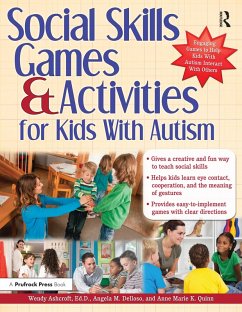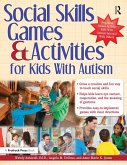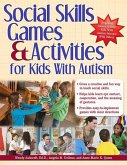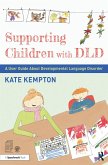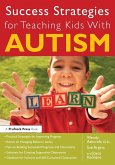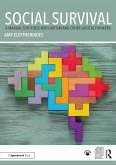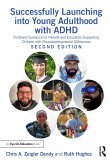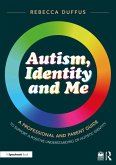Wendy Ashcroft, Angie Delloso, Anne Quinn
Social Skills Games and Activities for Kids With Autism (eBook, PDF)
20,95 €
20,95 €
inkl. MwSt.
Sofort per Download lieferbar

10 °P sammeln
20,95 €
Als Download kaufen

20,95 €
inkl. MwSt.
Sofort per Download lieferbar

10 °P sammeln
Jetzt verschenken
Alle Infos zum eBook verschenken
20,95 €
inkl. MwSt.
Sofort per Download lieferbar
Alle Infos zum eBook verschenken

10 °P sammeln
Wendy Ashcroft, Angie Delloso, Anne Quinn
Social Skills Games and Activities for Kids With Autism (eBook, PDF)
- Format: PDF
- Merkliste
- Auf die Merkliste
- Bewerten Bewerten
- Teilen
- Produkt teilen
- Produkterinnerung
- Produkterinnerung

Bitte loggen Sie sich zunächst in Ihr Kundenkonto ein oder registrieren Sie sich bei
bücher.de, um das eBook-Abo tolino select nutzen zu können.
Hier können Sie sich einloggen
Hier können Sie sich einloggen
Sie sind bereits eingeloggt. Klicken Sie auf 2. tolino select Abo, um fortzufahren.

Bitte loggen Sie sich zunächst in Ihr Kundenkonto ein oder registrieren Sie sich bei bücher.de, um das eBook-Abo tolino select nutzen zu können.
Social Skills Games and Activities for Kids With Autism provides complete instructions for using fun, engaging games and activities to teach social skills to children with autism spectrum disorders.
- Geräte: PC
- ohne Kopierschutz
- eBook Hilfe
- Größe: 3.29MB
Andere Kunden interessierten sich auch für
![Social Skills Games and Activities for Kids With Autism (eBook, ePUB) Social Skills Games and Activities for Kids With Autism (eBook, ePUB)]() Wendy AshcroftSocial Skills Games and Activities for Kids With Autism (eBook, ePUB)20,95 €
Wendy AshcroftSocial Skills Games and Activities for Kids With Autism (eBook, ePUB)20,95 €![Social Skills Games and Activities for Kids with Autism (eBook, ePUB) Social Skills Games and Activities for Kids with Autism (eBook, ePUB)]() Wendy AshcroftSocial Skills Games and Activities for Kids with Autism (eBook, ePUB)15,95 €
Wendy AshcroftSocial Skills Games and Activities for Kids with Autism (eBook, ePUB)15,95 €![Supporting Children with DLD (eBook, PDF) Supporting Children with DLD (eBook, PDF)]() Kate KemptonSupporting Children with DLD (eBook, PDF)17,95 €
Kate KemptonSupporting Children with DLD (eBook, PDF)17,95 €![Success Strategies for Teaching Kids With Autism (eBook, PDF) Success Strategies for Teaching Kids With Autism (eBook, PDF)]() Wendy AshcroftSuccess Strategies for Teaching Kids With Autism (eBook, PDF)20,95 €
Wendy AshcroftSuccess Strategies for Teaching Kids With Autism (eBook, PDF)20,95 €![Social Survival: A Manual for those with Autism and Other Logical Thinkers (eBook, PDF) Social Survival: A Manual for those with Autism and Other Logical Thinkers (eBook, PDF)]() Amy EleftheriadesSocial Survival: A Manual for those with Autism and Other Logical Thinkers (eBook, PDF)23,95 €
Amy EleftheriadesSocial Survival: A Manual for those with Autism and Other Logical Thinkers (eBook, PDF)23,95 €![Successfully Launching into Young Adulthood with ADHD (eBook, PDF) Successfully Launching into Young Adulthood with ADHD (eBook, PDF)]() Chris A. Zeigler DendySuccessfully Launching into Young Adulthood with ADHD (eBook, PDF)26,95 €
Chris A. Zeigler DendySuccessfully Launching into Young Adulthood with ADHD (eBook, PDF)26,95 €![Autism, Identity and Me: A Professional and Parent Guide to Support a Positive Understanding of Autistic Identity (eBook, PDF) Autism, Identity and Me: A Professional and Parent Guide to Support a Positive Understanding of Autistic Identity (eBook, PDF)]() Rebecca DuffusAutism, Identity and Me: A Professional and Parent Guide to Support a Positive Understanding of Autistic Identity (eBook, PDF)20,95 €
Rebecca DuffusAutism, Identity and Me: A Professional and Parent Guide to Support a Positive Understanding of Autistic Identity (eBook, PDF)20,95 €-
-
-
Social Skills Games and Activities for Kids With Autism provides complete instructions for using fun, engaging games and activities to teach social skills to children with autism spectrum disorders.
Dieser Download kann aus rechtlichen Gründen nur mit Rechnungsadresse in A, B, BG, CY, CZ, D, DK, EW, E, FIN, F, GR, HR, H, IRL, I, LT, L, LR, M, NL, PL, P, R, S, SLO, SK ausgeliefert werden.
Produktdetails
- Produktdetails
- Verlag: Taylor & Francis eBooks
- Seitenzahl: 216
- Erscheinungstermin: 23. September 2021
- Englisch
- ISBN-13: 9781000488760
- Artikelnr.: 62568571
- Verlag: Taylor & Francis eBooks
- Seitenzahl: 216
- Erscheinungstermin: 23. September 2021
- Englisch
- ISBN-13: 9781000488760
- Artikelnr.: 62568571
- Herstellerkennzeichnung Die Herstellerinformationen sind derzeit nicht verfügbar.
Wendy Ashcroft is an experienced special education teacher widely known for her leadership of Project REACH, a support program for children with autism. Wendy also teaches education courses and supervises practicum and student teaching experiences at Christian Brothers University in Memphis, TN.
Angie is an experienced special education teacher and board certified behavior analyst. She enjoys a challenging and fulfilling career as a Student Response Team consultant for Shelby County Schools in Memphis, TN. She provides training and consultation to special education teachers, general education teachers, parents, administrators, related service providers, school psychologists, paraprofessionals and school counselors to promote evidence-based practices to changing behavior in students with disabilities. In this role, Angie also enjoys developing and providing presentations at local, state, national and international conferences on the following topics: applied behavior analysis, autism specific strategies, social skills instruction, parent support and intervention, visual supports, Positive Behavior Interventions and Support, functional behavior assessments, and behavior support plans. Angie began her career as a special education teacher 16 years ago when she received her bachelor's degree in special education from the University of Memphis. She had the privilege of teaching students with autism spectrum disorders, intellectual disabilities and physical disabilities in the classroom setting, along with working closely with many families during in-home parent training opportunities. Angie received her master's degree in behavior analysis and therapy from Southern Illinois University in 2003, which included her invaluable experience as a lead clinician in the Childhood Autism Project. In 2010, Angie completed coursework to obtain her administrator's license through the Educational Leadership Program at Christian Brothers University. Angie lives in Lakeland, TN with her husband and two children.
Angie is an experienced special education teacher and board certified behavior analyst. She enjoys a challenging and fulfilling career as a Student Response Team consultant for Shelby County Schools in Memphis, TN. She provides training and consultation to special education teachers, general education teachers, parents, administrators, related service providers, school psychologists, paraprofessionals and school counselors to promote evidence-based practices to changing behavior in students with disabilities. In this role, Angie also enjoys developing and providing presentations at local, state, national and international conferences on the following topics: applied behavior analysis, autism specific strategies, social skills instruction, parent support and intervention, visual supports, Positive Behavior Interventions and Support, functional behavior assessments, and behavior support plans. Angie began her career as a special education teacher 16 years ago when she received her bachelor's degree in special education from the University of Memphis. She had the privilege of teaching students with autism spectrum disorders, intellectual disabilities and physical disabilities in the classroom setting, along with working closely with many families during in-home parent training opportunities. Angie received her master's degree in behavior analysis and therapy from Southern Illinois University in 2003, which included her invaluable experience as a lead clinician in the Childhood Autism Project. In 2010, Angie completed coursework to obtain her administrator's license through the Educational Leadership Program at Christian Brothers University. Angie lives in Lakeland, TN with her husband and two children.
Chapter 1 Social Skills and Children With ASD Chapter 2 Essential ABA
Principles for Teaching Social Skills Chapter 3 Strategies and
Methodologies Useful for Teaching Social Skills Chapter 4 Assessing and
Monitoring Social Skills Chapter 5 Using the Complete the Puzzle Framework
Chapter 6 The 10 Social Skills and the Games and Activities Chapter 7
Adapting the Puzzle Framework for Early Learners Conclusion References
About the Authors
Principles for Teaching Social Skills Chapter 3 Strategies and
Methodologies Useful for Teaching Social Skills Chapter 4 Assessing and
Monitoring Social Skills Chapter 5 Using the Complete the Puzzle Framework
Chapter 6 The 10 Social Skills and the Games and Activities Chapter 7
Adapting the Puzzle Framework for Early Learners Conclusion References
About the Authors
Chapter 1 Social Skills and Children With ASD Chapter 2 Essential ABA
Principles for Teaching Social Skills Chapter 3 Strategies and
Methodologies Useful for Teaching Social Skills Chapter 4 Assessing and
Monitoring Social Skills Chapter 5 Using the Complete the Puzzle Framework
Chapter 6 The 10 Social Skills and the Games and Activities Chapter 7
Adapting the Puzzle Framework for Early Learners Conclusion References
About the Authors
Principles for Teaching Social Skills Chapter 3 Strategies and
Methodologies Useful for Teaching Social Skills Chapter 4 Assessing and
Monitoring Social Skills Chapter 5 Using the Complete the Puzzle Framework
Chapter 6 The 10 Social Skills and the Games and Activities Chapter 7
Adapting the Puzzle Framework for Early Learners Conclusion References
About the Authors
